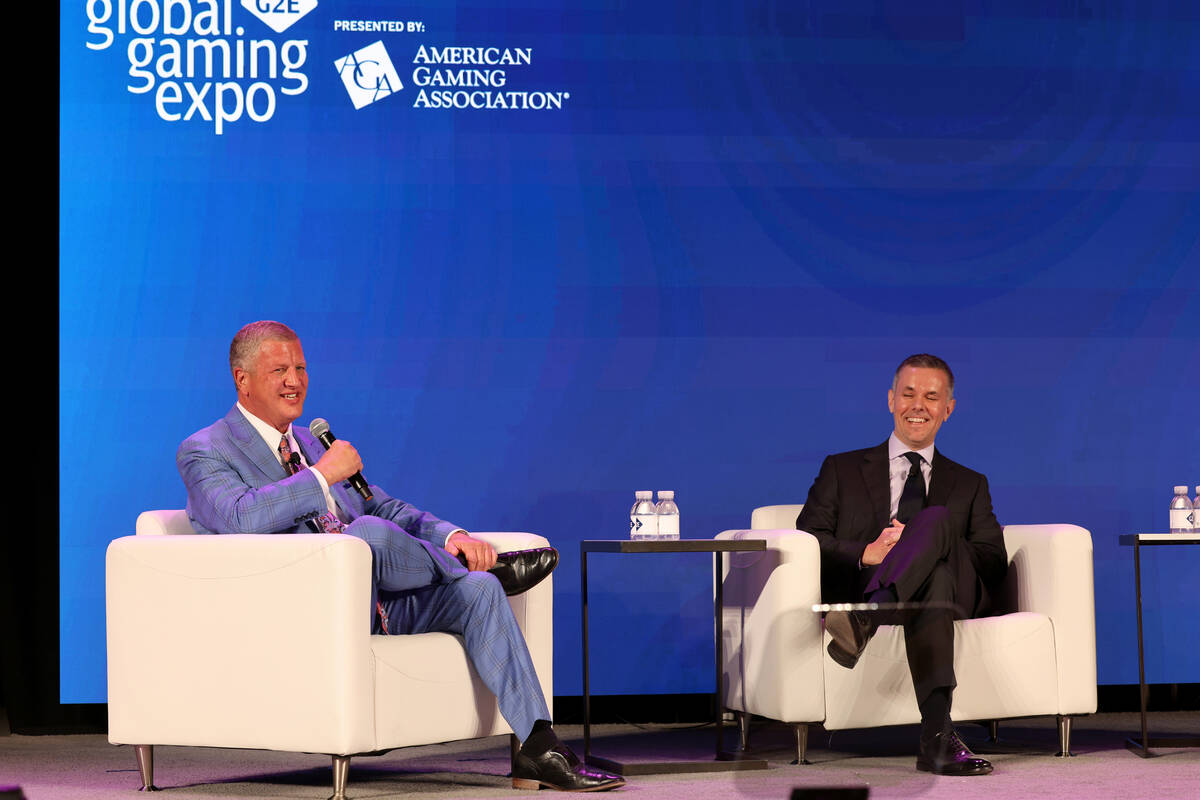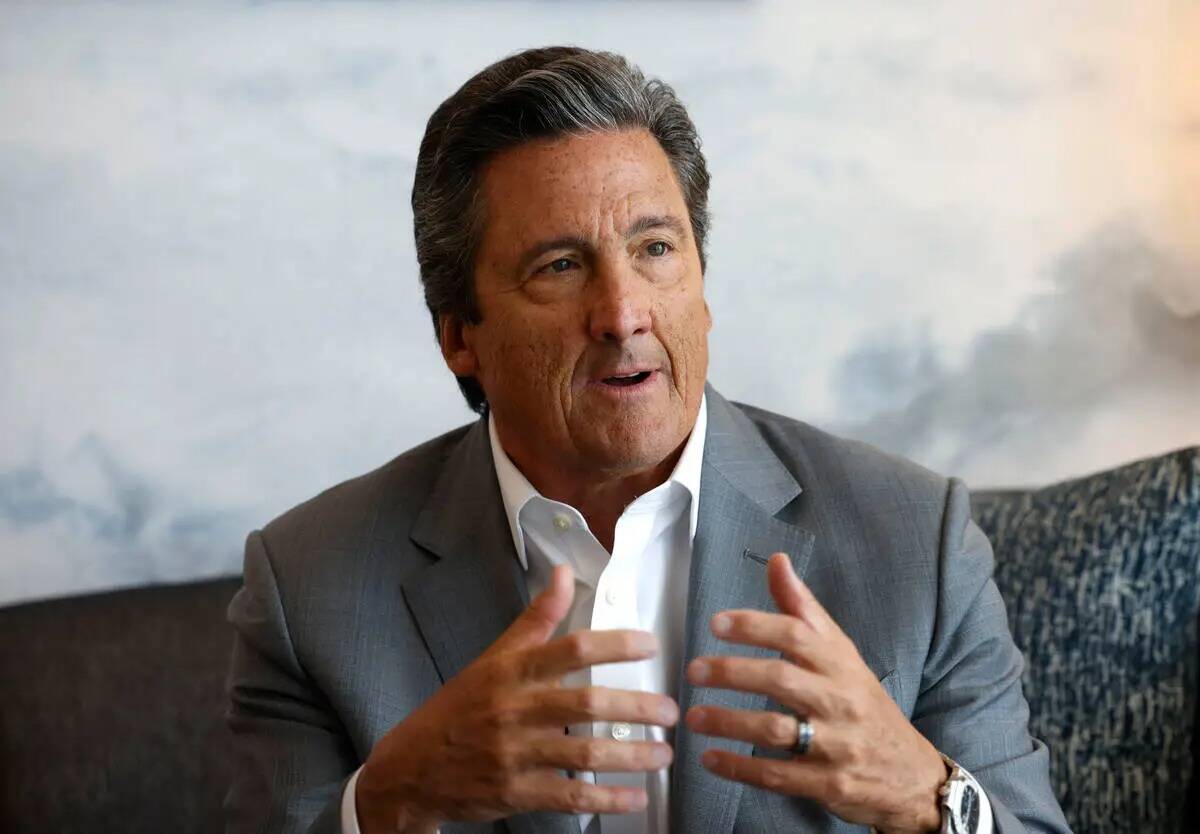Casino stocks have taken a hit as investors worry that tariffs and a potential recession will slow tourism to Las Vegas and curtail local residents’ spending at their neighborhood properties.
The most recent gaming revenue reports put out by the Nevada Gaming Control Board show gaming revenue fell nearly 5 percent year-over-year in March after a nearly 14 percent drop in February when compared to the 2024 Super Bowl in Las Vegas. Visitation to Las Vegas is down more than 700,000 or nearly 7 percent during the first three months of the year and hotel occupancy is down nearly 3 percent over February and March while convention visitation is down for the year.
Casino executives, however, weren’t sounding the alarm upon the recent release of their first quarter earnings despite some taking steps like Wynn Resorts holding off on remodeling its Encore Tower over concern of higher prices due to tariffs imposed by the Trump Administration. There are concerns since gross domestic product went negative in the first quarter, signaling a potential recession ahead.
Wall Street analysts are still bullish on the major Las Vegas players of MGM Resorts International, Caesars Entertainment, Wynn, Boyd Gaming, Red Rock Resorts, and Golden Entertainment.
Caesars reported it achieved the third-best first quarter performance on record with same-store adjusted earnings for Las Vegas properties of $433 million and improved margins. Executives said they haven’t seen any sign of consumers slowing down.
Some two-thirds of revenue in Las Vegas comes from non-gaming, unlike when it was the reverse 30 years ago so properties have other sources of income.
Caesars expects 2025 to be a record year for group bookings, with particular strength in the fourth quarter. “While we recognize the tremendous uncertainty surrounding the economic impact of potential policy changes in the U.S., we are encouraged by the forward outlook for Las Vegas,” said Caesars President and COO Anthony Carano. “We continue to experience solid operating numbers by both leisure and group and convention customers.”
MGM Resorts executives said they expected a record hotel month in April for occupancy and rates, citing its partnership with Marriott with more than 440,000 room nights booked. Group and event performance has been strong, contributing to the positive outlook.
CFO Jonathan Halkyard said MGM achieved 4 percent net revenue growth supported by strong average daily room rates, which were up 7 percent year over year. He added that its luxury resort offerings on the Strip served as a distinct competitive advantage, driving top-line growth up 5 percent during the quarter.
“In Las Vegas, our strength continues, particularly at the high end we make roughly 75 percent to 80 percent of our adjusted property (earnings),” said CEO Bill Hornbuckle. “The idea of a luxury campus and being focused on the epicenter of activity here has paid off, and we feel will continue to. And Marriott is off to a great start. We’ve booked approximately 75 percent over our expectations.”
Hornbuckle said MGM, which has the market cornered at Tropicana Avenue and the Las Vegas Strip where the A’s plan to construct a $1.75 billion stadium on the former Tropicana Las Vegas site, is well-positioned for its future.
“If you just take a moment and think about the positioning of us and all of these stadium/arenas between T-Mobile, Allegiant and the new A’s stadium within a mile and really at the epicenter of our resorts, we have over 1 million seats a month that are accessible to some sport or entertainment activity and programming,” Hornbuckle said.
While tariffs have delayed Wynn’s remodel at the Encore, CEO Craig Billings isn’t worried about being affected by any economic downturn because it’s customer base is affluent. There’s definitely uncertainty in the marketplace overall, but he said Wynn is in a good place through April.
“In Vegas, revenue per room was up slightly from 2024, slot handle was up and group activity was as expected,” Billings said. “We will see once things start to kick in and the impact of decrease in port traffic and impact of tariffs set in but as of now everything is pretty good actually.”
Off the Strip and at its downtown properties, Boyd Gaming said they aren’t feeling the effects of any potential slowdown, saying play from its core players continued to grow on a companywide basis during the first quarter.
“We’ve not seen any meaningful shift in consumer behavior or spending patterns thus far in the second quarter through the first three weeks in April,” Boyd Gaming CEO Keith Smith said. “We see our core customers continuing to grow and continue to show up and participate. That’s a strength since we came out of COVID. The retail customer performs on a consistent basis, and we feel very good about the direction.”
Downtown Las Vegas saw revenue and earnings growth, and Smith said there were encouraging customer trends with visitation from Hawaii and healthy pedestrian traffic along Fremont Street.
Boyd Gaming is under construction with its Cadence Crossing casino that will open in east Henderson in mid-2026, replacing the Joker’s Wild Casino adjacent to the master-planned community of Cadence.
“We remain confident in the future of our Southern Nevada operations,” Smith said. “The long-term fundamentals of the Southern Nevada economy remain strong with consistent growth in the local population, employment and tourism.”
Red Rock Resorts CFO Stephen Cootey said the first quarter was strong with Las Vegas achieving its highest first quarter net revenues and adjusted earnings in its history. The company is touting the success of its opening of the Durango Casino & Resort in December 2023 that has added 95,000 new customers to its database.
“It’s on pace to become one of our highest margin properties generating returns net of cannibalization of nearly 16 percent through the first quarter of 2025,” Cootey said.
Durango’s $120 million expansion will be completed in late December, adding 25,000 in casino space, including a new high-limit slot area and bar. It will introduce 230 new slot machines with 120 going to the high-limit room.
Cootey said the Las Vegas locals’ market is resilient to handle any downturn. The operator grew during recessions in the early 1980s, early 1990s and early 2000s since customers like convenience, proximity and affordability. The housing collapse in 2008 and pandemic in 2020 don’t apply to typical downturns, he said.
“That supports consistent visitation even in softer economic environments,” Cootey said. “That’s slightly different from the way the Strip reacts during a recession.”
Red Rock continues to make investments in its Sunset Station and Green Valley Ranch properties in Henderson to take advantage of the growth in the Cadence master plan and Ascaya luxury development. Work is expected to start in June on renovating rooms at the Green Valley Ranch and those will be back in service by the end of the year. Renovations to rooms and convention areas will cost $200 million.











